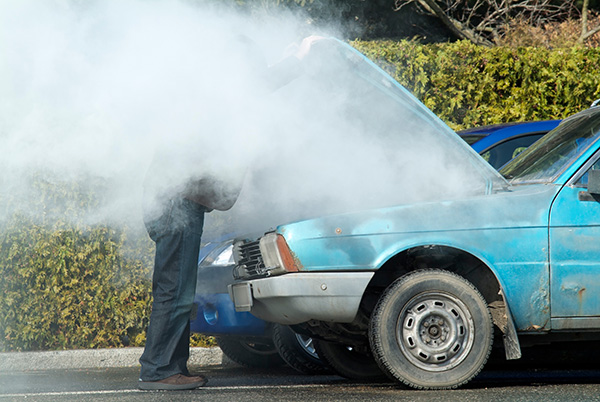
There’s nothing quite as stressful as seeing steam rise from under your car’s hood while you’re stuck in traffic or driving down the highway. An overheating engine isn’t just an inconvenience—it’s a serious issue that can cause significant damage if not handled correctly. Knowing what to do when your car starts overheating can prevent breakdowns and help keep you safe on the road. Let’s look at the causes, the steps you should take, and how to prevent your engine from overheating in the first place.
Why Do Cars Overheat
Engines generate intense heat, and the cooling system works to regulate the temperature by circulating coolant and dissipating excess heat. When something disrupts this process, temperatures can skyrocket, leading to overheating. Here are some of the most common causes:
- Low Coolant Levels – If your car doesn’t have enough coolant, it won’t be able to regulate the engine’s temperature effectively.
- Coolant Leaks – Leaks in the radiator, hoses, water pump, or other parts of the cooling system can cause coolant to escape, leading to overheating.
- Malfunctioning Thermostat – The thermostat controls the flow of coolant. If it gets stuck closed, the coolant won’t circulate properly, and your engine will overheat.
- Broken Water Pump – The water pump keeps coolant moving through the system. If it fails, heat can’t be removed from the engine efficiently.
- Clogged Radiator – Dirt, debris, or internal blockages in the radiator can prevent proper heat dissipation, causing the engine to overheat.
- Hot Weather & Heavy Traffic – Extreme heat and stop-and-go traffic put extra strain on your cooling system, increasing the likelihood of overheating.
Knowing the cause of the problem is important, but the real question is—what should you do if your car starts overheating while you’re driving?
Steps to Take When Your Car Overheats
1. Turn Off the A/C and Turn On the Heater
It may seem strange, but turning on your car’s heater can actually help reduce engine temperature. The heater pulls excess heat away from the engine and directs it into the cabin. While this won’t fix the underlying problem, it can help stabilize the temperature while you look for a safe place to stop.
2. Pull Over and Shut Off the Engine
If you see steam coming from the hood or notice the temperature gauge spiking into the red zone, pull over immediately. Driving with an overheated engine can cause severe damage, including a blown head gasket or a warped cylinder head. Once you’re safely off the road, turn off the engine and allow it to cool down for at least 15-30 minutes.
3. Do Not Open the Radiator Cap Right Away
One of the biggest mistakes drivers make is opening the radiator cap while the engine is still hot. The cooling system is under pressure, and opening the cap too soon can cause hot coolant to spray out, leading to serious burns. Always wait until the engine has cooled before checking coolant levels.
4. Check the Coolant Level (If Safe to Do So)
Once the engine has cooled down, check the coolant reservoir. If it’s low or empty, adding coolant may help temporarily, but this doesn’t solve the root problem. If the coolant level was already sufficient, the issue may be a faulty thermostat, a broken water pump, or another mechanical failure.
5. Look for Signs of Leaks
If you notice a puddle of coolant under your car, you likely have a leak somewhere in the system. Leaks can come from the radiator, hoses, or even internal components. A visible leak is a clear sign that your car needs to be checked by a professional as soon as possible.
6. Call for Assistance If Needed
If adding coolant doesn’t help or if you’re unsure what’s causing the problem, it’s best to call for roadside assistance or have your car towed to a repair shop. Continuing to drive an overheating vehicle can lead to catastrophic engine damage.
How to Prevent Your Car from Overheating
Overheating can be a stressful and costly issue, but regular maintenance can help you avoid it. Here’s what you can do to keep your cooling system in top shape:
- Check Your Coolant Regularly – Make sure coolant levels are within the recommended range and top off if necessary.
- Flush the Coolant System – Over time, coolant can become contaminated and lose effectiveness. Flushing the system at regular intervals helps maintain optimal cooling performance.
- Inspect Hoses and Belts – Worn or cracked hoses can cause leaks and lead to overheating. Check them periodically and replace them as needed.
- Monitor the Temperature Gauge – If you notice the temperature creeping up more often than usual, get your car inspected before the problem worsens.
- Have Your Radiator Inspected – A clogged or damaged radiator can prevent heat from dissipating properly. Keeping it clean and functional ensures your engine stays cool.
- Be Cautious in Hot Weather – If you’re driving in extreme heat, try to avoid long idling periods and be mindful of your engine’s temperature gauge.
If you find yourself dealing with frequent overheating issues, it’s best to have your vehicle checked by a professional to prevent long-term damage.
When to Seek Professional Help
While minor overheating issues can sometimes be addressed with basic troubleshooting, persistent overheating requires expert attention. Ignoring the warning signs can lead to severe engine damage, which is far more expensive to fix than a simple cooling system repair.
If you’re in Brentwood, CA, and need a cooling system inspection or repairs, make sure to schedule an appointment with our trusted repair shop. Catching problems early can save you from being stranded on the road and facing costly repairs.
Engine overheating is never something to ignore! Bring your car to Monkey Wrenches in Brentwood, CA, for a full cooling system inspection. Don’t wait until it’s too late—schedule your appointment today!